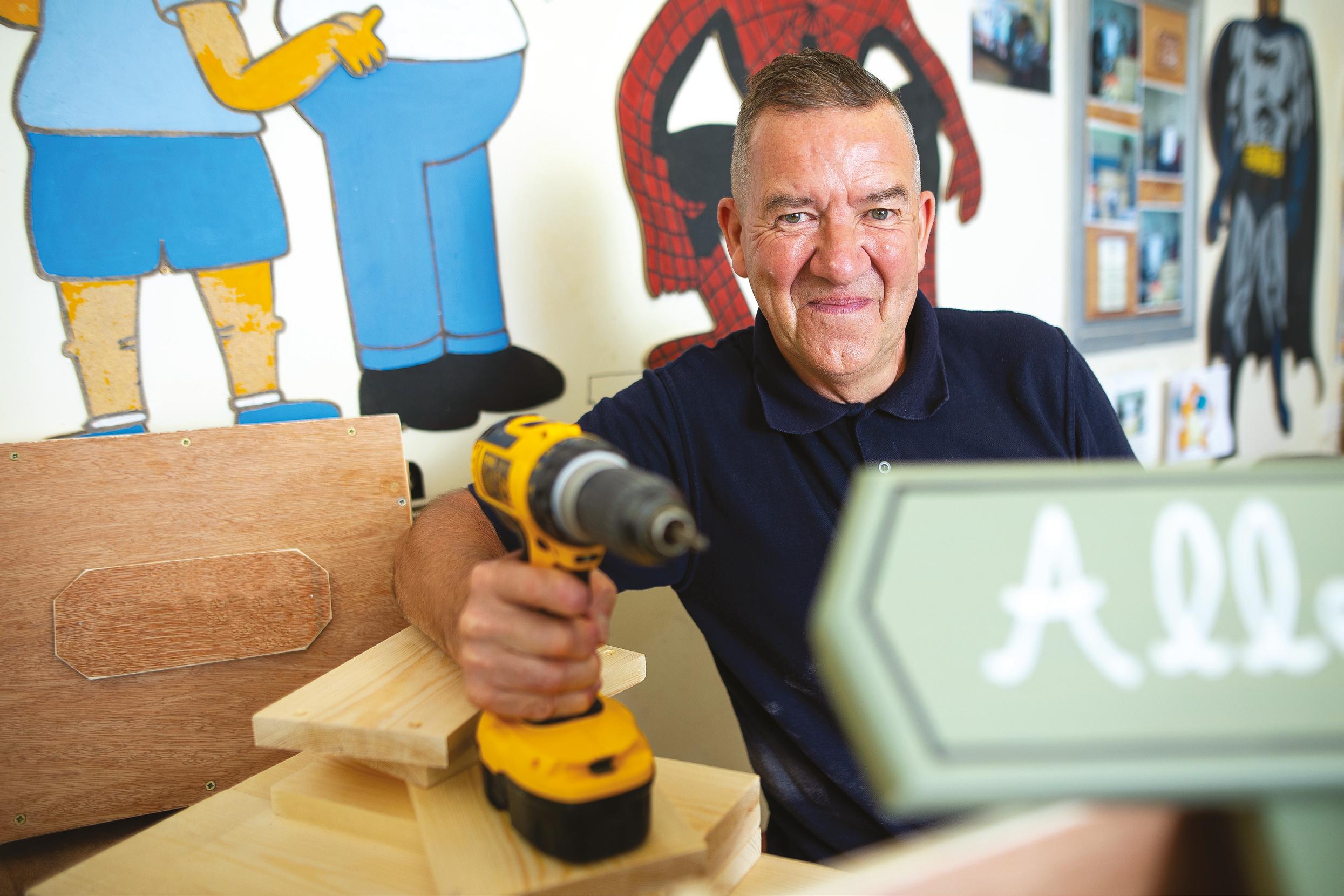
4 minute read
WHERE’S THE NEAREST LOO?
Have you ever had the urge – to go to the loo that is – and made it by the skin of your teeth? Don’t tell Georgina Cole.
As a specialist bladder and bowel nurse she sees the impact of holding on till you’re desperate and it’s not good.
Georgina leads a team of highly trained specialist nurses. Many patients can be helped back on the road to control in three sessions. Causes can range from complications giving birth and prostate related problems requiring training in using key muscles, to people of all ages who may have suffered unimaginable damage from sexual abuse.
Many incontinence issues are lifestyle related and easily resolved yet people are worried about discussing them.

Illustration by Shae Fowlis
“They worry about a smell, whether others can tell if they’ve had an accident, or if examinations will be painful, which isn’t the case. This may be the first time they’ve spoken about these issues, with hidden emotions coming to the fore.
One of the first myths Georgina and her team debunk is that restricting fluid intake stops the urge.
“That’s untrue. When urine gathers and sits, the bladder sends an urgent message to your brain, which is what makes you have to suddenly dash. We need one and a half to two litres of fluid a day to help flush out the toxins in our body.”

Georgina Cole, team leader for the Bladder and Bowel service team for adults.
Great news for those who need two large mugs of strong coffee before even contemplating breakfast?
Unfortunately not, says Georgina. “Caffeinated drinks like tea, coffee, fizzy drinks, alcohol. They’re all diuretics, which strengthens your urge to go. Try to stick to decaffeinated drinks, or better still, water.”
All this may sound stern, but for many patients simple steps make a big difference.
"Constipation can push the bowel against the bladder and cause a sudden urge to pee. A good balanced diet can help prevent constipation and reduce this urge. Eating more fibre is a good way to reduce constipation.
"The bladder is in the pelvic area so pelvic floor exercises really help – starting early in life will pay dividends later."
And when you do get the urge and there’s not a loo in sight? Says Georgina “Squeeze and lift your pelvic muscles up to your tummy, it might work for a while!”
MY HUSBAND CALLS THEM MY BILLY CONNOLLY PANTS!
Retired practice nurse Margaret had enjoyed a full active social life until her bladder problem got in the way. “I’d spend half the night excusing myself, they’d say ‘you’ve only just been’ – it became so embarrassing I started declining invitations."
Overnight visits to friends stopped too, as Margaret found herself unable to make it from the bed to the toilet in time. Buying – and wearing – incontinence pads, felt distinctly embarrassing and uncomfortable.
It was when she was referred to a neurologist for what was diagnosed as a spinal cord lesion that Margaret learned her bladder problem was related.
“When I came to the Bladder and Bowel service the nurse told me my bladder wasn’t emptying, which was why I felt I needed to go so often. She ordered a supply of knickers – my husband jokingly calls them my Billy Connolly pants! They’ve made a huge difference.
“I wish I’d gone to them earlier. The nurses make you feel normal. There’s no embarrassment, I’d tell anyone to go and get help.”
TO LEARN MORE about the Bladder and Bowel service go to merseycare.nhs.uk
Reduced services may be running Mersey Care's website has full details.
TAKING AWAY THE FEAR FOR CHILDREN

Nurse Nicola Worthington supports children and families.
Play clay and balloons are part of Nicola Worthington’s tool bag to help children overcome their fears of going to the toilet.
"Children and parents can both be quite anxious. We offer lots of reassurance that they’re not on their own– and we will sort out the problem."
Jake is nine and regularly wets his underwear. His mum says he won’t have friends to stay, go on cub camps, or even sleep at his grandma’s house.
It’s a familiar story says Nicola, who leads the children’s bladder and bowel team. “Older children are often so embarrassed they hide their underwear from parents or carers. It’s still a taboo subject; parents don’t talk about it in the playground.”
Nicola has worked with hundreds of children under 19. She uses experience to listen to the voice of the child as well as the parent and help both understand the issues. Balloons grab the child’s attention to demonstrate how the bladder works. She recommends play clay as a distraction for children with fear of the toilet.
She works closely with school nurses and other referral services and says parents are grateful of the difference it can make to family life.
“I’d say to any family, don’t wait to get help. It may take time but we will make things better.”
To learn more about the Bladder and Bowel service go to merseycare.nhs.uk
(The service may be reduced during the pandemic)
Other sources of support
ERIC – The Children’s Bowel and Bladder Charity: eric.org.uk
Bladder and Bowel Community supports people in the UK who are living with conditions that affect their bladder or bowel: bladderandbowel.org
Poo nurses UK – supports children with constipation and soiling: thepoonurses.uk










